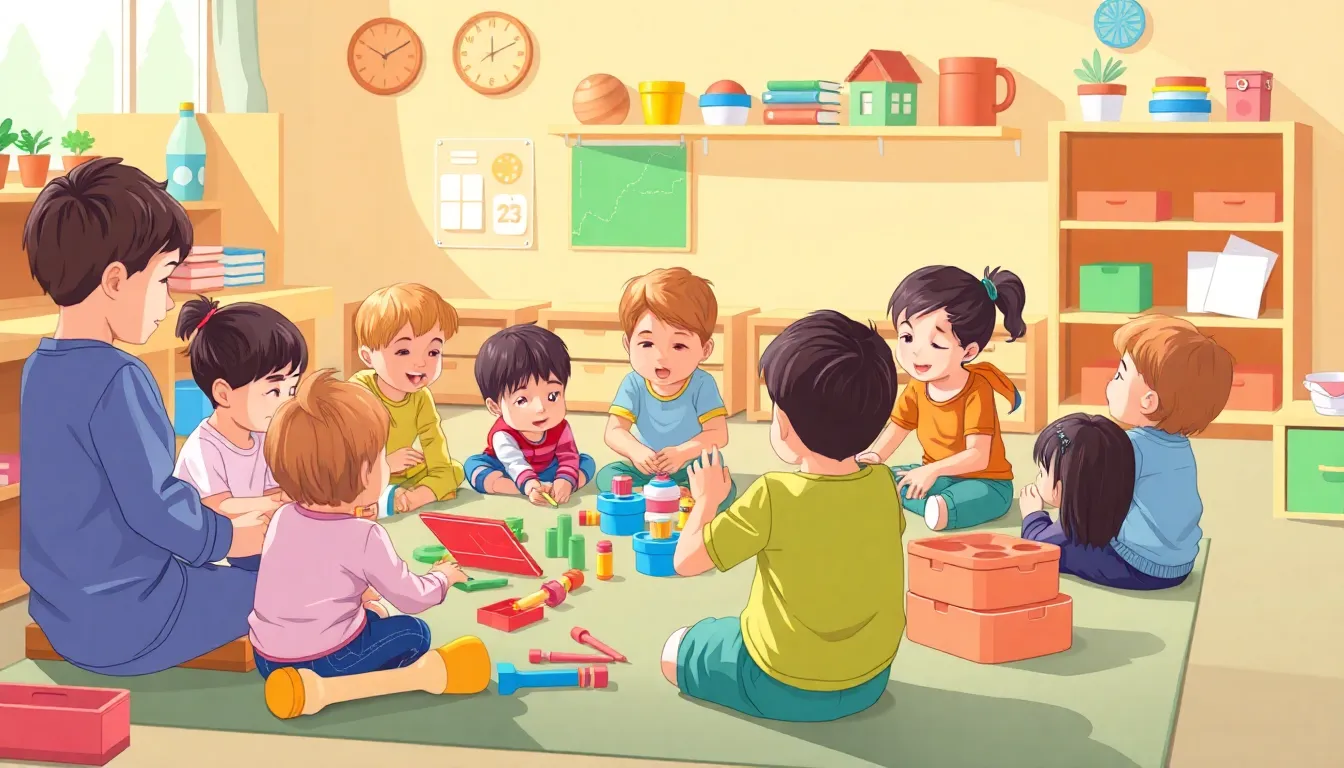In a world where tiny humans run the show, a Bachelor of Arts in Early Childhood Education is like having a backstage pass to the greatest show on Earth. Imagine turning chaos into creativity while shaping the minds of future leaders, artists, and maybe even the next big TikTok star. This degree isn’t just about crayons and nap times; it’s about unlocking potential and making a lasting impact.
Table of Contents
ToggleOverview of Bachelor of Arts in Early Childhood Education
A Bachelor of Arts in Early Childhood Education prepares individuals for a crucial role in shaping young minds. This degree equips future educators with the knowledge and skills necessary to support children’s growth and development. The curriculum typically includes courses on child psychology, learning theories, and classroom management techniques.
Programs emphasize practical application through hands-on experience, often including student teaching opportunities. Students assess developmental milestones and learn to create enriching learning environments tailored to diverse needs.
Graduates often pursue various career paths, such as preschool teachers, childcare center directors, or early intervention specialists. Additionally, they may find roles in educational consulting or curriculum development. With a Bachelor of Arts in Early Childhood Education, individuals become advocates for children, promoting creativity and exploration.
Core competencies include understanding childhood development and applying pedagogical practices that encourage curiosity. The degree also fosters the importance of family engagement, helping educators build strong partnerships with parents.
Pursuing this degree offers a pathway to make significant contributions in early childhood education.
Program Curriculum


The Bachelor of Arts in Early Childhood Education features a comprehensive curriculum designed to equip students with essential knowledge and skills. This program includes core and elective courses, ensuring future educators gain expertise in various aspects of early childhood education.
Core Courses
Core courses focus on critical subjects, shaping a strong foundation in early childhood education. Students explore child psychology, where they learn about emotional and cognitive development. Learning theories offer insights into effective teaching strategies for diverse learners. Classroom management equips future educators with strategies to create positive learning environments. Student teaching experiences provide hands-on practice in real classroom settings, allowing students to apply theoretical knowledge practically. Understanding childhood development helps professionals cater to the varied needs of young learners.
Elective Courses
Elective courses enhance the learning experience with specialized topics. These courses allow students to delve into subjects like special education, focusing on techniques for teaching children with unique needs. Programs may also include courses on technology integration, equipping educators to incorporate digital tools effectively. Additionally, classes on family engagement teach strategies for involving families in the educational process. Creative arts courses foster imagination, encouraging students to inspire creativity in their future classrooms. By selecting electives, students tailor their education to fit specific interests and career goals.
Career Opportunities
A Bachelor of Arts in Early Childhood Education opens the door to numerous career paths. Graduates find opportunities in various settings, addressing the vital needs of young learners.
Teaching Positions
Preschool teaching ranks among the most common roles for graduates. These educators foster creativity and facilitate learning in early childhood settings. Kindergarten teachers also play a crucial role, guiding children as they develop foundational skills. Special education teachers support children with disabilities, ensuring an inclusive environment. Additionally, positions as home visiting educators connect teachers with families, providing vital resources and support.
Administrative Roles
Administrative roles offer another avenue for graduates. Childcare center directors oversee daily operations and manage staff, ensuring quality care and education. Program coordinators handle curriculum development and staff training, focusing on best practices in early childhood education. Administrative positions may also include education consultants who advise organizations on effective strategies. Finally, these roles often require strong leadership skills to create a positive learning atmosphere.
Benefits of Earning a Bachelor of Arts in Early Childhood Education
Earning a Bachelor of Arts in Early Childhood Education provides multiple advantages for aspiring educators. Increased job opportunities arise, as many employers prefer candidates with a bachelor’s degree for teaching positions. Graduates often find themselves qualified for diverse roles, from preschool teachers to administrative positions.
Knowledge gained during the program leads to deeper understanding of child development. Courses cover emotional, social, cognitive, and physical aspects of growth, which enhances educators’ ability to support young learners effectively. This knowledge allows them to design age-appropriate curricula that foster creativity and critical thinking.
Skill development plays a crucial role in this program. Graduates enhance their classroom management strategies, effective communication techniques, and collaboration with families. Such skills create supportive learning environments where children thrive. They also prepare educators to address individual learning needs, ensuring inclusivity in diverse classrooms.
Networking opportunities abound for students within the field. Connecting with professionals during their studies opens doors for internships, job placements, and mentorships. Relationships formed with peers and faculty often lead to invaluable support throughout their careers.
Advocacy becomes a key component for graduates as well. Through the program, they learn the importance of promoting children’s rights and well-being. Engaging with families and communities enables them to be effective advocates for quality education that nurtures children’s growth.
Comprehensive knowledge and hands-on experiences prepare graduates for real-world challenges. Student teaching allows them to apply theories in practice and gain confidence in their abilities. Practical exposure ensures they are ready to face the demands of early childhood education.
Challenges and Considerations
Entering the field of early childhood education presents unique challenges and considerations for future educators. High emotional demands often emerge as teachers nurture young children, requiring resilience and self-care. Building relationships with families also plays a significant role in creating a supportive educational environment.
Understanding diverse learning needs represents another obstacle. Educators encounter children from various backgrounds, each possessing distinct strengths, interests, and challenges. Adapting teaching strategies to accommodate these differences enhances educational outcomes. Additionally, some children may require special education services, demanding knowledge of appropriate interventions and support systems.
Balancing the curriculum poses a further challenge. Educators must integrate academic standards with play-based learning approaches. This balance fosters creativity while ensuring children meet developmental milestones. Navigating administrative expectations can add complexity, as teachers work under regulations that govern classroom practices.
Managing classroom behavior similarly demands attention. Developing effective classroom management techniques requires ongoing practice and reflection. Cultivating positive behavior among diverse groups of children is critical for a harmonious learning atmosphere.
Continual professional development plays a vital role in overcoming these challenges. Engaging in workshops and conferences allows educators to stay updated on best practices. Networking with other professionals also provides support and valuable insights into shared experiences.
Navigating salary expectations poses yet another consideration. Early childhood educators often face lower compensation compared to their K-12 counterparts. Salary disparities can impact job satisfaction and retention within the field. Advocating for fair wages contributes to greater recognition of the significance of early childhood education.
Addressing these challenges through dedication and ongoing learning ensures educators effectively contribute to the future development of children.




